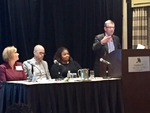
A White House Summit on Apprenticeships last week shone a spotlight on an apprenticeship model to promote greater access to healthcare careers. Laura Beeth, Fairview’s System Director of Talent Acquisition and chair of CCAP's workforce development work group was one of 100 leaders at the national summit, and she spoke to the gathering immediately after Vice President Joseph Biden.
U.S. Senator Al Franken was a keynote speaker at the event, along with Secretary of Labor Thomas Perez and Secretary of Commerce Penny Pritzker.
Beeth learned in Washington that Fairview will receive a $750,000 grant to support 150 nurses and other healthcare workers advance on career ladders through a Department of Labor apprenticeships grant. A key focus for the project is supporting two year degree nurses to obtain four year degrees and better wages, which the Partnership believes is a critical element to its goal of hiring more Central Corridor residents. The funding for Fairview is part of a $5 million federal grant to the Minnesota Department of Economic and Employee Development (DEED) and the Department of Labor and Industry (DLI) to expand registered apprenticeships in high-growth jobs, including health care.
"It is great news to receive such strong support from the White House Summit," reflected Beeth. "Now I hope that this grant can inspire additional funding to adapt and expand this model and serve a larger number of Central Corridor residents seeking health care careers."
CCAP Support for Apprenticeships Model
The Central Corridor Anchor Partnership adopted a resolution on May 12 this year to support a pilot initiative to integrate education and career planning for two year degree nurses to work for several years in long term care, while they complete a BSN degree and receive training and support for ultimate employment opportunities in acute care.
The Partnership has recognized that there are strong national, state, local and organizational pressures to have at least eighty percent (80%) or more of hospital nursing jobs filled with four year BSN nurses by the year 2020. While significant progress is being made to promote more diversity in four year BSN programs, two year degree nursing graduates have traditionally been a more ethnically and culturally diverse population than the four year degree graduates, and thus are important to the CCAP’s workforce goal and objectives. Sixty-five percent (65%) of St. Paul College’s nursing students, for example, are persons of color; sixty percent (60%) of MCTC's nursing graduates this year were born outside of the U.S.

“This is fantastic news for the students we serve who are pursuing health care careers,” noted Avelino Mills-Novoa, President of Minneapolis Community & Technical College. “It is gratifying to see a White House Summit bringing attention and traction to an apprenticeship model that is very relevant to our students.”
Time for Creative Partnerships

MCTC has a nursing education partnership with Augsburg College, where MCTC nursing students are provisionally admitted to Augsburg’s Bachelor of Science in Nursing program. According to Augsburg’s President and CCAP Chair Paul Pribbenow, this is but one example of strategic alliances that the Central Corridor Anchor Partnership can pursue to promote educational and economic opportunity for students. “We are living in a time where creative and nimble partnerships are increasingly important,” Pribbenow observed. “And you can see from the White House Summit that our Anchor Partnership is on the right track with this model.”
Two year degree nurses are more likely to find employment in long term care, where wages are lower, and resources for tuition reimbursement and nursing education advancement are more scarce. Without thoughtful intervention, a more diverse nursing workforce in acute care is less likely, and the population of more diverse two year degree nurses are more likely to stay employed in long term care, where wages are lower and advancement opportunities are less. The caregiver turnover rate and vacancy rate for long term care facilities in the Twin Cities are significant; and while many four year RNs may start their careers in long term care, most have moved to acute care settings within a relatively short time.
Next Steps and National Significance
The Partnership's work group is currently solidifying participation among hospitals, long term care facilities, and nursing educators to build the apprenticeship model and prepare funding applications. The current plan calls for establishing up to 200 additional nursing apprenticeships, which when added to Fairview’s 150 would create a pilot of national significance.
